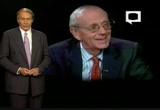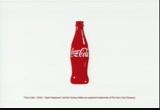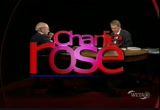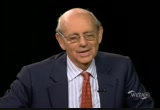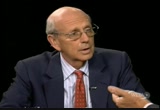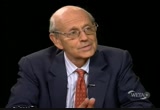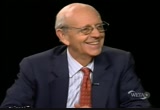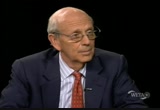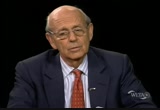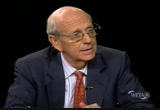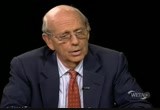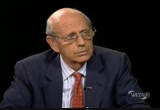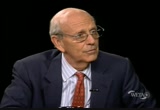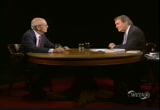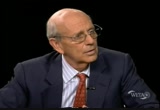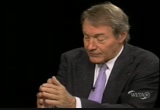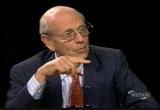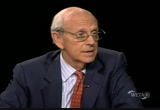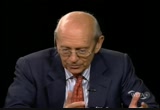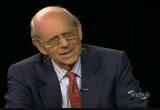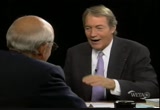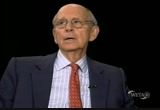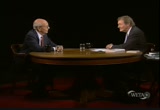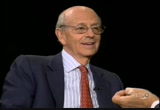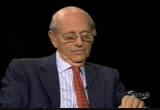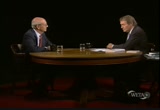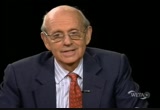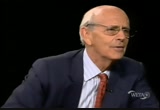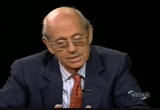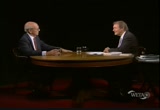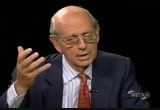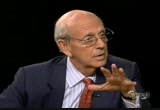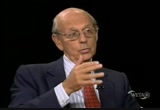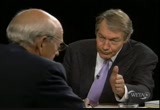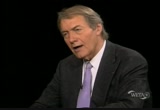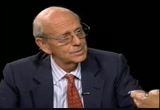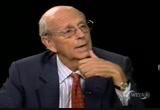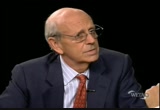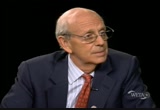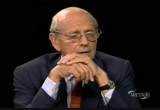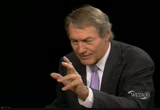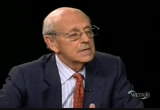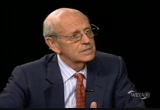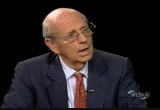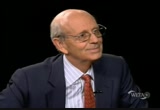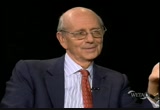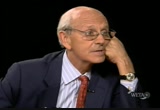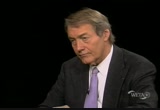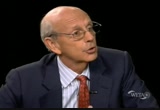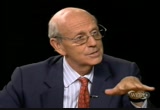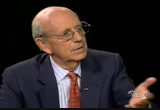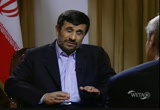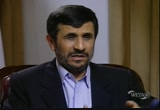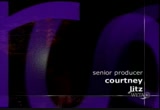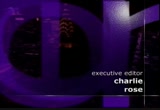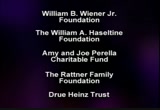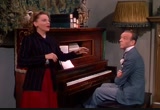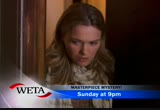tv Charlie Rose PBS September 17, 2010 11:30pm-12:30am EDT
11:30 pm
with associate justice of the supreme court stephen breyer. >> if you are going to decide under law, that means people called judges will make these decisions. in difficult case of interpretation, on the borders. all right. they'll make mistakes sometimes. so you have to decide you're going to support an institution that will do things that are sometimes very unpopular. you have to decide that. i have to decide that. very unpopular. and sometimes the judges will be wrong. and are are you prepared to do that. and what i want to show people in this book is why they might be prepared to do it. and that's, i tell some stories. and i try to explain how these decisions, many of them, current how they look through my eyes. i can't say i have the secret. i can say this is how i approach different areas and try to decide them. and i don't call it politics. and i don't call it just
11:31 pm
11:32 pm
captioning sponsored by rose communications from our studios in new york city, this is charlie rose. >> stephen breyer is here. he is as you know an associate justice of the united states supreme court. he was appointed by president clinton if 1994, prior to that he served for 14 years on the federal appeals court. he was also chief counsel to the senate judiciary committee. over 16 years on the supreme court, he has emerged as something of a counterpoint to the conservative views of justice antonin scaleia. his new book about the responsibilities of the supreme court it is called "making our democracy work"
11:33 pm
a judges view. i am very pleased to have justice breyer back on this program. welcome. the last time you were here you were the most junior justice. >> yes. >> rose: are you no longer that. >> no. >> rose: but you were the second longest serving junior justice in the history of the court. >> yes. >> rose: what did that mean? >> it meant i could almost achieve immortality by being the answer to a trivia question. there is no difference. the junior justice opens the door in the conference in case somebody forgot a piece of paper or wants a cup of coffee or something and you hand it to the person who it belongs to, if there is a knock on the door. >> rose: i love what you said. the great thing about being a supreme court justice is you get to do homework every day. >> i told my son that, about being a judge. my job, because it describes the job of being a judge on an appeals court, including the supreme court, you read and you write. that's the job. my word processor behind me
11:34 pm
and i have briefs and endless readings in front of me and i did say that. i said if you do your homework really well you get a job where you can do homework the rest of your life, that's true. >> rose: do you believe for a man of your own intellectual curiosity and intellect this is the perfect job? >> i'm very, very lucky to have this job. and it is a perfect job. and if you say curiosity and intellect you mean you read or are interested in what other people are doing. and i, you could find out through literature and you can find out by talking. and you can find out by using your imagination. and for an appelate judge that's important. because when you're in that room, as you are, and writing and reading, what you are goinging to write is going to affect other people. so it's very important to have the imagination to try to understand how your opinions and your decisions will affect the lives of others. >> rose: why are things that you read like literature important to a judge?
11:35 pm
>> i told a group of undergraduates here in new york a few weeks ago when i was asked that question. and i said it's like knowing a foreign language or reading a novel. we only have one life. and we only really know our own. but by reading novels and by reading what other people have written about life, and about different ways of living, you can lead more lives than your own. and you can understand how people could have lived a quite different life. and that's a wonderful privilege to be able to do that as well as i think a necessity for someone whose's goinging to affect the lives of other people. >> rose: does it help you understand the law. >> help you understand the law? perhaps sometimes. i think anything that helps you understand human beings will help you, ultimately understand the law. that's what law's about. >> rose: any experience that you wish you had had that
11:36 pm
you did not have when you came to the court? >> it would have been helpful if hi been on a trial court. my brother is on a trial court. he's a trial judge in san francisco. and he loves being a trial judge. and that practice in the courtroom, if you could do everything, i would have liked to have had that experience. but i didn't. >> rose: you got appointed to the court of appeals. >> that's right. hi other experiences. >> rose: this is called "making our democracy work, a judges view", what do you want it to accomplish? i mentioned the fact that you somehow have taken it on yourself to explain in a sense, your own-- the work of the court and the explanation of why the court's important and what it is that americans need to know about their court. >> that's a fair comment. i think what sandra o'connor and really david suitor too and others, tony kennedy too and others in the court, more and more realize that
11:37 pm
what we used to have which was a blessinging was a course called 8th grade civics or 12th grade civics. and in 12th grade civics we learned how a lot of parts of the government worked. and in a democracy like ours it's important for people to know how their democracy works because it's their government and it won't work unless they understand it. all right this is a slight effort in that direction. i want people to understand about the court and it seemed to me i can tell you in ten minutes the mechanics. but the mechanics aren't the court. what's at the heart of it is making decisions. and i want them to see why the court was initially given the job of reviewing congressional statutes to see if they can form to the constitution. i want people to see what a fragile, fragile institution in that respect this court was for many decades. they said the cherokee
11:38 pm
indians, the president of the united states, then andrew jackson sent the federal troops to kick the indians out. he didn't follow the court. you remember, perhaps, when president eisenhower sent the 101s airborne division that is why i was thinking paratroopers . he sent the 101s airborne to little rock to make certain the court's decree was carried out. that those black children entered the white school. and we've reached a stage perhaps now where more and more people in the country will understand that it's better to follow the decisions of the court even when they're very controversial as they sometimes are supposed to be. >> rose: to a remarkable decree americans have accepted that. >> yes. >> rose: when the decision of the nixon watergate decision came down, accepted it. >> yup. >> rose: i know but accepted it. when 5-4 bush versus gore came down. >> that's right. >> rose: accepted it. >> natter. >> rose: said this is the final word. >> that's right, that's right. >> rose: and the court has
11:39 pm
no battalions. >> no. >> rose: to go enforce it. >> no. but it accepted the authority of the court. >> the chief justice of ghana, a woman whose's trying to really produce democracy in ghana and help with the court its was in my office about a year ago. and she said what's the secret. >> rose: great question. >> i said i wish i knew. i can't tell you a secret but i can tell you a little bit about a history. and i said it's that history. it's those paratroopers that went in to little rock and it's a lot of bad things too. those are good things but there were other bad ones. but it's that history with its ups and downs that has produced what senator reid said was the most remarkable thing about bush v gore, a case, he said, which he didn't agree with, i was in dissent. i didn't agree with it but he said that remarkable thing is not often remarked. and that is people did not
11:40 pm
despite their opposition and the fact that it might have been wrong, which i thought it was, they did not go into the street. >> rose: you thought it was wrong because you thought they should have counted all the votes. >> correct. well i thought-- i wrote what i thought. i thought they should recount. i thought they had the right to go and recount. and-- . >> rose: was it politics or law? >> that i think was law. i can understand why people feel it was too political. but part of what i want to do here is to explain that politics is not the norm in the supreme court. you are part of it. >> rose: somebody comes to you and says george bush was not really elected president. the court simply, issued a decree you would say yes, he was, because the supreme court said he was. >> i would say better read the decisions and i would also point out that one of the virtues that we have in this country is accepting decisions even when they're very important and even when they're wrong, rather than try to fight with guns to
11:41 pm
overturn them. and there are a lot of countries where that latter is a real alternative. that's what i see in my office. i said, i've said this many times, but i see people every race, every religion, every point of view. every point of view and my mother used to say there is no view so crazy there isn't somebody doesn't hold it in this country. and these people are very different points of view u outlook, et cetera, will decide under law. if are you goinging to decide under law, that means some people called judges will make these decisions. in difficult cases of interpretation, on the borders, all right. they'll make mistakes sometimes. so you have to decide you're going to support an institution that will do things that are sometimes very unpopular. you have to decide that. i have to decide that. very unpopular. and sometimes the judges will be wrong. and are you prepared to do that. and what i want to show
11:42 pm
people in this book is why they might be prepared to do it. and that's... i tell some stories. and i try to explain how these decisions, many of them, current, how they look through my eyes am i can't say i have the secret. i can say this is how i approach different areas and try to decide them. and i don't call it politics. and i don't call it just doing the good. and i certainly don't call it deciding everything on the basis of some historical fact, though history is relevant. >> rose: the constitution, how do you see it? and its purpose. and connect that to your purpose and the supreme court's purpose. >> all right. i see it, you say in the most general terms. >> rose: yes. >> most of us will agree, this document is a fairly brief document. and what it does, it tries to secure az it's come to be amended and understood, a democracy. democratic institutions, so
11:43 pm
people can make their decisions themselves about what kind of country they want. but a special kind of democracy. protecting basic individual rights. divide pog we are states federal, three branches, so no group of government officials becomes too powerful. assuring a degree of equality and insisting upon a rule of law. >> rose: that's the most highly general. >> those highly general things are made more specific in a document of just a few pages. and they use words like liberty involve freedom of speech. and then to become more specific yet, well, that often requires us to interpret those words and to apply them to see whether congress has fallen inside or outside the boundaries because they set boundaries. and there i have-- . >> rose: the institution is the under-- the constitution sets the boundaries. >> correct. and the congress can to the go beyond the boundaries. and that's basically our life in life at the frontier are boundaries, sometimes
11:44 pm
tough there are tough cases, abortion, inside or outside, school prayer, inside or outside. those are hard. >> rose: right to bear arms. >> yeah, inside what does it mean. that's the kind of case we have. now i try here to say you know, i can't bring you through every case. i would have trunks full and trunks full of cases and would you have to stay up all night to read all these opinions and i know no one will do that not even joanna my wife, they have no reason to do that. so i have tried to summarize this and organize it in a way that they will get an idea of how one judge, me, because i know myself the best, goes about this and they'll see that there are ways of doing it that aren't political. there are ways of doing it that aren't just doing what you think is good. and there are ways of doing it that don't rely on looking to what alexander hamilton or someone else thought about whether an individual in the 21st century could have a pistol next to his bed. >> rose: alexander hamilton had no thought about the
11:45 pm
21st century. >> he did not know what we would be like. he knew there would be a 21st century. >> rose: and he knew his purpose was. >> oh what i think what the minority thought there was the purpose of that particular provision. was to assure the states that they could raise militias and congress would not destroy the state militias. >> rose: explain to me in your own words the difference, the basic difference between how you see the constitution and how a significant number of other justices have seen it. but specifically antonin scalia. >> well, i think if i put him, if i-- he's best characterizing himself, you know, i hesitate to characterize other people. but he does put a lot of weight on history. and i think that he thinks. >> rose: originalism and all that. >> yes, yes. i think he thinks, he wants to see what people in the 18th century thought was a cruel and unusual punishment. and if they thought nothinging in the navy was not cruel, then nothinging in the navy now is not cruel.
11:46 pm
>> because he thinks it's about values. >> well, i think it's about valuesment you might think it's about values am but after all, values are general matters. a value that can change in their application as conditions change it might well be that those who wrote the 14th amendment to free the slaves, in reality the 13th frees the slaves. the 14th says equal protection of the laws. and they knew at that very time that schools were segregated in the district of columbia. they knew that. but what they didn't know is the true horror that segregation would produce over the course of the next 80 year its. and they wrote a value, a value of equality and a value of treating people inclusively in this country, into those words which by 1954, and brown versus board
11:47 pm
of education, meant in the eyes of the judges, certainly in mine and i suspect in yours, segregation cannot continue. >> rose: it amazes me how long the dred scott decision stood. >> dred scott you are thinking-- ferguson, it stood 80 years, 70 something. yeah, it did. because that brings you back to the first part. because a third of the country or more really supported it. and a whole legal institution called racial segregation grew up and they really supported it. and we have only a few. >> rose: what percentage of the court's work is deciding the constitution of legislation? >> i think, the constitution as opposed to the constitutionality of legislation is probably well under half, 30%, 40%. most of what we do is interpret federal statutes. there are laws that congress passes, what do they mean. environmental statutes.
11:48 pm
>> rose: more than 50% is deciding what federal statutes mean. >> yes, yes. and what you probably won't read too often is-- . >> rose: go ahead. >> 40, probably 30 to 40% of our decisions are are unanimous. the 5-4s are probably 20, 25%. not always the same five and same four. you will read about cases that have a lot of sociological or social society, you know, a lot of impact. people really interested. but there are many, many others that is only a small percentage. >> rose: here is what is interesting me. there was this notion that people in the political debate would say we don't want the supreme court legislating. they would say that. >> yeah. >> rose: on the other hand there is also this idea, you subscribe to which is judicial modesty. >> uh-huh. >> rose: you were willing to give the congress some lat future. >> uh-huh. well, i put this as not a real case. but i'm talking about statutes, i found a french
11:49 pm
railroad man, because there was a story in a french newspaper. and it set a biology for a teacher in a high school was bringing some live snails in a basket on a train to paris. and the conductor came up and said you have to pay for a ticket, buy a ticket for the snails. and he said what? and the, he said read the tariff. it says you cannot bring animals unless you bring them in a basket and if you bring them in a basket you have to buy a ticket. he said they didn't mean snails, he said are snails animals. there you have a statutory interpretation question. not so obvious. and why didn't he make them buy 20 tickets. there mr. 20 snails. it is a way would you approach that, so let's assume that decision facing you. the way you would approach that is you go back and see what legislative intent was. >> that's right, i try to figure out why did they write this into the manual. what was the purpose of this rule. did it have something to do with insurance. did the insurance have to do with snails? i mean, didn't they really
11:50 pm
mean house pets? and who wrote it and what did they have in mind. >> rose: now you say a very interesting thing about arguments before the supreme court. you come in, when they come in there you will prepared to be changed. you have a certain set of principless that you believe in, a certain attitude but you are prepared to be changed by oral argument. >> that's right. i think most of us are. >> rose: ho most of you are, you believe, not all. >> well w most of us most of the time. nobody says everything about everybody all the time. >> rose: so therefore, you move towards-- toward a point where a decision is made, a decision is written, and it's over. there's no more changing. describe this process for you. >> i think you already know it, i suspect you go through a similar 3r0 ses. you have to decide what kind of program to have next week. >> rose: right. >> and it's a tough decision. and you have three things to decide, a, b or c and finally you say a. all right, you usually think oh, how wrong i was, no.
11:51 pm
as time passes, you usually think i wasn't that wrong. it wasn't that hard. and then you think how right i was. that is the normal psychological protection people have and i think works the same way in the court. >> rose: and how much are you influenced by the idea of what clerks do. >> the clerks are very helpful. what clerks will do in an argued case, and remember the cases that we argue out of probably 8,000 requests, the cases that we select are almost all cases where lower court judges have come to different con-- conclusions on the same question of federal law. one thinks the word liberty means this, the other that. one thinks snails mean this, the other that. so there are divisions of opinion, so that tough questions. the first thing the law clerk will do is he'll read the briefs. or she will. but i will, so now we have two sets of eyes going
11:52 pm
through those briefs. and i'm going to tell her, write a memo. and she'll write a very long memo. and if i'm writing the case i want her to go back over that memo and add to it anything she thinks is relevant. >> rose: if you have been asked by the chief justice to write the opinion. >> that's right. then i will take those memos and i will read them and i will go back to the briefs and i will read them. and then it's time to turn around to the word processor. and i write a draft. and i give it to my clerk. and she will look at it and she's really thinking that hers is a lot better but nonetheless she's very polite. and she says okay, i'll go with this. and what she does is then she works on that and tries to find all the flaws and tries to make it accurate and anything she can add and shouldn't be there, i get that. and i think oh dear, there's still problems with this. usually they are problems with what i put in but not always. and then i usually turn and write another draft. and then i give it to her again. and then we're back and forth probably four or five times before we have something to circulate. >> rose: okay. fair enough. so finally agree on
11:53 pm
something that you think is -- >> well, you know, i can say it is to the exactly a democracy in there. i say okay, i'm satisfied with this. we're going to go with it. >> rose: you are not prepared to be overruled by a vote of your clerk. >> no, i'm not, i'm not. >> rose: so then you circulate it. >> yes. >> rose: and what happens when you circulate it? >> when you circulate to other members of the court, they read it. and they'll go over it with some care. and then they'll write back. and of course i like to get a note which says i join the opinion. and they might write back that. >> rose: is that it, they write you back and say i join. >> sometimes they'll say i have a few problems here. look at this, this, this and this. and i hope you'll be able to deal with twhem. and i'll try to deal with them. and usually i can. sometimes not. and there's a little bit 6 floating here while people see if somebody might write a dissent. they'll say i'm going to write a dissent. we wait and see what the dissent looks like, i will react to the dissent. it is a good thing because it produces a better opinion. it's going to have the best
11:54 pm
arguments there on the other side and i will have to respond. so then eventually things settle down and everybody can write or join and we whop that at least one opinion draws five votes because then it's the opinion of the court and the bench and the bar know what the law is. >> rose: when does the vote come as to whether it is 5-4 or 9-0. >> there is a preliminary vote in the conference. people's preliminary decision before people have worked out, seen the draft because he had haven't been written yet. the final vote comes when those pieces of paper are in. and each time-- . >> rose: the opinion. >> the opinion, the dissent, somebody can right a con krerns or they write a piece of paper saying i join breyer's draft or i join ginsburg graft, everybody has to join or right. and the thirst thing in the conference each week is you have a list of where beam stand on each case and the chief will say is everybody in on this case. why are you not in yet?
11:55 pm
well, let's make up our mind. and when minds are made up are you in, that's it but a person could change up until the very last second if he wants to. before that opinion, sometimes apparently it's happened, not while i've been there, but somebody has a change of heart before the next opinion session. it's all ready to be announced. he says no, i'm changing and it doesn't come down. to the last minute. >> rose: do they go back to the drawing room. >> i don't know. >> rose: it has never happened since you have been there. >> no, it has to the been at that late time. people have changed. >> rose: when the chief justice decides who writes the opinion. >> only if he is in the majority. whoever is sen quer in the majority decides. but it's not a total free choice. because everyone over the year will write the same number of drafts. and same number of majorities. and you know, sometimes the question of who should write answers itself. >> rose: now here's another aspect about this, talking about the clerks. there have been some
11:56 pm
reporting lately about clerks. and some justices seem to want to choose clerks who have worked with for previous judges that they agree with their politics. you were given a buy on that and said that pretty much chooses 50/50. >> somebody did that research. political scientists love this kind of research. they love it. and insofar, well, i mean what it showed because i did see the article, it showed in the last five years i have had 24 clerks and 13 of them have come from judges who were appointed by democrats and 11 from judges appointed by republicans. all right, fine. that's not totally without interest. but it is not i think the most interesting thing. the most interesting thing to me is how do you decide these cases. what kind of view do you bring to bear. what are the approaches that will help you reach better decisions. >> rose: are you prepared to say then that every justice on the court pretty much shows a kind of open mind
11:57 pm
that you believe you show? >> when i-- it is human nature. what is wrong with it, because i'm deciding how honest to be. >> rose: exactly right. exactly right. >> why don't you be honest. what do you have to lose. >> i will be, i will be. and i understand the norpal thing of human nature. and agree with me, charlesie, i think you know, there's an open minded person. and when you don't agree with me, sometimes i think but how could he possibly come to that conclusion. >> rose: yes. >> and so over time you do begin to understand that people have different pints-- points of view. >> rose: you understand that from the beginning. >> you understand it on paper from the beginning. you understand the words,. >> rose: but so you are suggesting that sometimes some of your colleagues come to a point of view in which you believe that it was all just predetermined because -- >> it's less than you think.
11:58 pm
it's less-- it's less than you think. but it is i think, i mean look, people over time, have been in a profession 30, 40 years, they develop general approachs. and they develop general views about how law relates to individuals. about what government in the united states is like. about what our society is like. about how this constitution or other statutes relate to human life and human beings. and that has an effect on how they interpret the words. they have views that all of us look at text. all of us look at history. all of us look at traditionss, all of us look at precedent. all of us look at purposes, all of us look at consequences viewed in light of the purposes. but some judges will as i've said, pay much more attention to text and precedent and they believe they can-- history can answer the question and
11:59 pm
others like me believe those things don't very often. >> rose: this is what i think political scientists have also determined, and these words aren't necessarily perfect but that within what is considered to be a liberal group, you are the one who most often strays. >> it's up to others to say whether decisions are liberal or conservative. it is up to me to try to get the decision as best i can a correct decision. and if you want to know this isn't meant to be necessarily about me, but i think the easiest way for me to try to get other people to understand what we do on the court is for me to go back over my decisions, as i've done, and say are there some general approachs that explain how i have reached decisions in different areas. and that's what i have set down and i think a person who reads that will come to the conclusion. >> rose: get that out of this book. >> i hope. >> you get a sense of the
12:00 am
framework in which you have come to make the decisions. >> yes which isn't the only possible one. >> rose: describe this frame cork to me. take us inside the mind of a justice. >> that's a good question. that i think on a very general level i'm trying to take say in the us it, things that have permanent value and apply them to worlds that continuously change. but that sounds like a fourth of july speech. so suppose that i you want to be more specific here. i would say when i'm considering statutes i want to consider the relation between the court and other branches of the government of the united states. >> rose: that's a principal that is an important part are of your framework. >> correct. because this document is meant to work as a whole. well this works over here but it doesn't work over there. it is meant to work as a whole so there is a coop rative arrangement. court and congress where do we have court and congress. statutes. courts relation to congress, interpreting statutes. and how do you go about it. i would say there i think key to that is the notion of
12:01 am
congressional purpose. which i explained. court and executive. court and executive mostly are the administrators. postly this topic of administrative law and we interpret and apply the legality of that. what's the key to that? i think it's comparative expertise viewed in terms of the statute that gives them the authority. court and states. what's the key to that? i think the key to that is what we call federalism, but what is several parts to it. and the europeans now use the word sub sid areaity which captures those parts pretty well and i describe how that explains a lot of leeway we give to the states. court and past courts. court and past courts, it's called the word technically story disease us, that's what you were talking about before. i said judge, you have to remember you're to the going to always accept every past case but stability is important in law. >> rose: you pay your respects in this book to
12:02 am
stare disease us-- diseaseus. >> court and past court no court and lower court you tend to think of it as hierarchical, i say don't, think of it as specialized roles. court and the president, where the president's not the administrator, he is protecting the security of the nation. very tough. court, we have human rights here, and hold the president accountable but beware because the president's in charge of security. and so i illustrate that with the case in guantanamo. >> rose: you do, all right so this particular court, does it surprise new terms of how it's looked at executive power especially in this area you have selected? guantanamo. >> i think it's a very, very, very, very hard question and cases that come up. i thought probably a recent case i was a dissenter in, they would lean too far in freeing the president from the control of the first amendment. and that was a tough issue. and i dissented because i
12:03 am
thought they went too far. in guantanamo, i was normally with the majority, in all of those cases and i thought these represent an effort by the court to hold the president accountable without interfering with his power, and that of congress to protect the security of the nation. the wonderful thing about a judicial opinion is if i think this, i have to write my reasons down. and it's the reasons that are written on the paper that act as the check. because you when are you interested can read it, and others will read it. and they can criticize and they do. but you see, all of this put together and even if i, i have an approach, it isn't the only possible approach by any means. but by the time a reader is looking at that and finished looking at some of the history and finished reading these stories which i think are really the most interesting part, i hope that reader will say this. my initial view that this is all politics wasn't right. >> rose: it was what, with was --
12:04 am
>> not all politics. if you use the word politics you haven't got the picture. >> rose: fair enough. but i must suggest to you that you have been i think jointly concerned with former justice o'connor about the politization of the court. >> we have mostly talked a lot-- . >> rose: because she has been on the edge of that, out there, surprisingly making it a cause. >> where we've talked specifically together, it's been about the elective process of state court judges and campaign contributions. and if you have huge campaign contributions goinging to judicial elections-- . >> rose: it's more than that, isn't it? >> you are afraid there, it is more than that. the whole thing put together makes you afraid that the public will not have confidence in the impartialality of the judge in an unpopular situation where fairness, rights and so forth cut in favor of somebody unpopular. and of course the key thing
12:05 am
is for the public to understand that you can't have that, don't have constitutions that-- institutions that bring that about. and the court has to understand the same. and that is what i think accounts in part for the public being willing to accept the court over a period of 200 years. >> rose: i'm sure are you are right. i think politization also means that people believe the process of confirmation has become too acerbic, too mean-spirited. and it went all the way back to justice-- potential justice bourke. tand continued forward. you had it easy. >> i did rrz i think it was '89 votes-- 89 votes for confirmation. >> about. >> rose: was it 89. >> i don't know, i have lost track but it was quite a few.
12:06 am
>> rose: same thing with justice ginsburg. the spirit of the process was different than it is now. what happened? >> well, this is, look,. >> rose: politics happened. >> yeah, yeah, but beware of this one. because the confirmation is a group of political people, namely the senate and a politically elected person, the president, trying to decide who will be on an institution that should be nonpolitical once they're appointed. and why did the framers want that? why did they write that into the constitution? they wrote it there because it's a little popular window in a democracy. so the public does have a say on who will be appointed to a job that later the person cannot decide on the basis of the public's favor. and that's a typical kind of constitutional compromise. if you think it's gone too far, i are the right kind of person to have a view on that as a member of the public. i was the confirmed person. i was not the nominating person so i say from my point of view it is like
12:07 am
asking for the recipe of chicken a la king from the point of view of the chicken. >> rose: rather than the point of view of julia child's. >> right, right, that's right. do you see what i am trying-- i'm doing my best to say from my point of view, read how we do this. please try to teach the next generations something about how our institutions work. and that is how we preserve what we have. which isn't so bad. >> rose: how do you think americans should approach this question of where they are goinging to locate the mosque in a constitutional framework. >> in a constitutional framework, the constitution, most people have said that this is, you know, everybody seems to be saying this is a constitutional right and so forth. and there is something we hope that will approach that as americans are when they're at their best. they say i want to know the facts. i want to know the facts. and i want to know the
12:08 am
arguments. and i want to think about a little dispassionately. and the more emotion there is on different sides, the more it helps to be a little dispassionate to learn the facts. and to try to decide accordingly. >> rose: and that's-- courts too. >> oh, certainly,. >> rose: there is a dispassionate look at the facts. >> that think and try to think these things through, the more the emotion, the more it becomes important not to decide on a purely emotional basis. >> rose: there is also talk about burning the quran. there is also the idea of expression, freedom of expression. today as a man of the court, what is it that the court says freedom of expression stops here. >> you have to be-- you see, you won't get totally satisfactory answers because in the back of my mind lurks the thing, will i get this as a case and i better not express a view but i can say
12:09 am
keep two cases in mind. when you try to work this out. on the one hand the famous thing of home saying you cannot, indeed, the law will forbid properly shouting fire in the a crowded theatre where the words can lead to death. on the other hand, remember that the court decided that burning a flag of the united states despite the emotional horror that produces, where it is being done as a symbo symbol-- symbol, a symbol of opposition is protected by the first amendment. >> rose: have you changed in how you see the law in the 16 years you served on the court. what have been the defining moments for you. or ideas. >> i think generally i would say it's a gradual process before you can take this general idea of the
12:10 am
constitution and try to general objectives and try to reduce them to something that is fairly specific in practice. and that happens to people. they get more and more experience. and therefore they begin to learn this area, that area, the other area. and sandra o'connor said this, that you start with footprints going in a certain direction. and then you tend to fill them in. and it's very hard to retrace your steps. and that happens over time. so i would say that the case i was most unhappy about probably was that affirmative action case where i thought the affirmative action in the schools was permissible. and i thought that the majority was wrong in sayinging it wasn't. and so by that time i had the ability, i had the experience, i had enough experience to be able to write down, i thought, as coghent as i could, and very firmly what my reasons were. in ten years earlier i couldn't have done it i don't think as well.
12:11 am
>> there are two books, stephen breyer active liberty, the first one interpreting our democratic constitution and now this, making our democracy work, a judges view. it seems to me that the country's pretty good about understanding and respecting the court. you get pretty good marks for this country, right? >> yes. >> rose: okay. secondly, there is this notion of american exceptionalism which i have never quite known what it means. but do we deserve some of that self-congratulations because of the nature of our founding fathers. and the documents and the institutions that were created? >> i think we deserve some. and i'll tell you, these sets of documents have managed over the course of more than 200 years to allow people who have grown from four million to 300 million,
12:12 am
from people if you look at that civil war movies, you see, you know, the series on television, you see-- . >> rose: ken burns, yeah, ken burns, you see before that time this was really almost exclusively a country of english descendants. and after that time it became southern and eastern europe. and now it's every race, every religion, every point of view. and it's expanded over and over. and still, still with 301 million people, people will put, will put their faith in these documents and how they're interpreted. and tuck phil, if you read what said in 1835 and you apply it to today, my goodness it's there. there's something about working with this form of government and working with the documents that create the government, that forces people in the fifth grade, as when i was in the fifth grade, and probably when you were in the gift grade, that
12:13 am
the teacher says today what we're goinging to do is we're going to have five of us work together in a group to accomplish a project. and when you have to work together in a group to accomplish a project, and that's the objective, you don't start bossing everybody around. and so this just an example. of how i think we've learned to work together. and a multiracial society, multiethnic society, a multireligious society, that takes alot of experience a lot of learning and we don't always get it right. and when we don't get something right, we sit down and try something else. and now other countries can do that. we're not exclusive on that. and more and more they are, are changing the nature of our society and more and more want to have democratic institutions and protections of human liberty and-- . >> rose: as defined by each individual country. >> but not exporting our view of democracy. we're exporting an idea of freedom.
12:14 am
>> but they can learn from what we do and we can learn from what they do. and we do learn. >> rose: as swrefer son did. >> of course, of course. >> rose: and we're becoming a better nation because of our respect, gender, respect are, because of our respect for the differences of -- >> that's a plus, big plus. >> rose: that's a huge plus. >> yes, yes. >> rose: walk down the street of new york city, but go home to my home in north carolina and walk down the street. it's different. >> i'm with you. >> rose: it's really different. >> i done know if you agree or not but winston churchill said that, he said america comes around always to making the right decision after trying every possible alternative. well there is something to that. because when something doesn't go write we sit back and we begin to look at it and more dispassionate way to figure out how to get it to go right. and i think you think that. >> rose: i do, definitely believe that. before you go here, you have an interest in architecture which, where did that come from?
12:15 am
>> when i was chief judge in boston in the first circuit we built a courthouse, a new courthouse. and doug woodlock who is a judge on the district court and i were sort of in charge of that. and we got in harry cobb who was a great architect and we held meetings in my office every single week and we got a courthouse built and it was the kind of courthouse i hope and i think that would bring the community into it. and they like it. and they do like it. >> rose: there is great photographic books-of-people who have gone around the country photographing courthouses too like churches. the other thing your interest in things french. >> culture, my wife is english. i know. >> rose: but you, you know, the french have honored you. you read french literature. in the original french. >> i do, that's true. part of it is related and part of it isn't. one part that is related is if you look at this constitution, it's the thought of the french
12:16 am
enlightenment and the scottish enlightenment. >> rose: scottish? >> yeah, scottish enlightenment, hume and locke and all these people in scotland in the 18th century. and the lum area, the enlightenment was universal. it wasn't just french but it was french and it was scottish. and you look at our document and those ideals are there captured in that document. and so it is, tuck phil, you reread tuck phil, i bet you had to read it in school. and if you reread it and will you see my goodness this is perceptive about our society, so part of it is that. part of it is someone told me a long time ago, an old woman, maria combardy. she said you know, stephen, if you can really learn a foreign language you'll be another person. and she didn't mean it will change-- she meant it's better. it's better to see things. so i've tried with that. >> rose: okay. so here's the question about
12:17 am
that. to your young grandchildren, they come to you and they say granddaddy justice, we want to learn a foreign language. but my friends father says that forget about french. >> uh-huh. >> rose: i should learn chinese. >> my answer, first they say grandpa, and i would say you know, you're going to have to make this choice, your parents will, because i can't. what about spanish. an awful lot of people in the united states speak spanish and spanish is a great language and let's try that. or maybe you want to learn french, that will open your eyes to a lot of things. and so will chinese. >> rose: history. >> not just history, a lot of things. but i say my interest, i would say learn a foreign language. and to to which one. >> rose: because will you become another person. >> because will you -- your eyes will be opened to something you can't see otherwise. you can't see it otherwise. and you will see, and it's
12:18 am
the same problem we were talking about before. it's important to understand how other people think. >> rose: also, tell me, i mean i'm really going to school on you for this because of an audience at home, you know. so books that have made a difference for you. tell me those that have really beyond the documents of a founding, of a country, that have made a difference for you in terms of giving you a sense. >> uh-huh. well some are obviously legal and i will skip those at the moment. but some are historical, gordon wood i think has great history and that's related to the founding of this country. but when i talked about tuck phil it's because it makes a difference. and the same is true which i hope people read, still is the education of henry adams. henry adams was a shrewd political observer. he was the pundit by a factor of ten. and he explains democracy
12:19 am
and carries you through his life, opens your eyes. another one that i think made a big difference in my life, is all bert camus. he wrote a book called the plague. and why does that, what resonates about that. it does, every time i look at it. the thing that resonates the most is this: he's writing about a city in algeria which is under siege by a plague but he's really writing about the german occupation of france. and during that siege some people behave well, some people behave badly. it's every type and my god every nightmare and every heroism. and at the end he says this, he says why have i told you this story. i have told you this story because i want these people's achievement or lack thereof to be recognizedive. want to tell you this story because it's the story of a doctor. and a doctor is a good model for how we can behave for the better in this world, to help other people directly
12:20 am
and not necessarily to theorize. but he said really it's because the germ of the plague, that is in each person that not so good could be terrible. the germ of the plague never dies, never dies. it goes into remission. it lurks in the hallways and in the cupboards and in the file cabinets. for one day to send forth its wraths. for the education of the misfortune of humankind to invade a happy city. and that talks to me because i say what am i in, what are we in as judges, or americans whatever institution we're in, but as judges we're there to be a small safeguard a small safeguard that won't always work. but if those wraths appear with that germ of the plague, we're there as a kind of dike and that's important.
12:21 am
and that's partly why i write that first reason, that first part of this book, i want people to see it. and they'll get it. >> rose: you also brandeis was your what -- >> i say brandeis is somebody i admire a lot. >> favorite, yes, yes. >> because? >> because he goes into the depths of a problem and looks at the facts of it and try os figure out how the facts and so forth make a difference. >> rose: that seems like basic. >> yeah, yeah basic but you can do it more or you can do it less. and then he has what i would call an attitude of allowing that legislature to do what it wants but there comes a point when they've gone too far. and we have to have the states as laboratories of experiment. but, but there is the but in the background which requires the judgement as to when things have gone too far. and i think that his opinions exempt few it
12:22 am
pretty well. >> rose: making our democracy work. thank you. >> pleasure. >> thank you. >> z. >> rose: our conversation recorded earlier this week with associate justice of the united states supreme court steph enbreyer. on our next program on monday night a conversation with the president of iran, a ahmadinejad who is in new york visiting the united nations. here's an excerpt from our fourth conversation which took place in may of this year. >> things are not resolved with one speech. a speech has to lead to action, action. mr. obama said that i want to create change. that this change must present itself, must show itself in iraq, it must show and happen in afghanistan. it must show and happen in palestine. it must show with regard to iran, now please pay attention. i am trying to help here. i'm trying to help you. i'm trying to help america
12:23 am
here. those who are behind this seize or within the u.s. administration in the obama administration are moving things in a direction which will make mr. obama to take radical positions, especially with respect to iran. some members of the permanent members of the u.s. security council little also doing the same thing. pleading-- leading mr. obama to a position that is irreversible vis-a-vis iran. as soon as mr. obama enterers into a series of behaviors that resembles mr. bush's behaviors, two things will happen. first, mr. obama's time is over. in other words, when mr. obama becomes radical in his behavior, what that means is there is no change. and therefore he has been defeated. he has failed. and his presidential term will be not useful.
12:24 am
secondly, america's most important-- historical opportunity will be-- opportunity will be lost, and america will no longer be able to replace itself in the world. i'm saying this as a person who sympathizes. captioning sponsored by rose communications captioned by media access group at wgbh access.wgbh.org
12:29 am
107 Views
IN COLLECTIONS
WETA (PBS) Television Archive
Television Archive  Television Archive News Search Service
Television Archive News Search Service 
Uploaded by TV Archive on

 Live Music Archive
Live Music Archive Librivox Free Audio
Librivox Free Audio Metropolitan Museum
Metropolitan Museum Cleveland Museum of Art
Cleveland Museum of Art Internet Arcade
Internet Arcade Console Living Room
Console Living Room Books to Borrow
Books to Borrow Open Library
Open Library TV News
TV News Understanding 9/11
Understanding 9/11